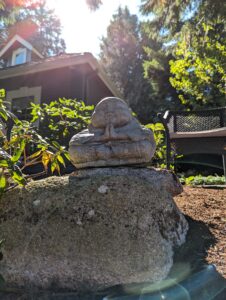 I named him Buddy, Buddy the Buddha. HW purchased him for me at the market and placed him on a stone, high on the hill in the front yard and visible from the street so that each time I pass by after a walk with the dog or to fetch the mail I hear in my head: “Have you meditated today?” I continue to find routinely practiced meditation effective for mental health improvement, especially what I call “quieting” the prefrontal cortex (PFC). The PFC is the first stop in the brain for all sensory inputs coming in from the outside world. Sort of the Grand Central Station of the human mind, always busy and buzzing with activity. The PFC has many functions, one of which is emotional regulation. If the PFC is untreated, this pathway can become dis-regulated, which has a number of negative consequences, a common one being the tendency to quickly react to people and events around us. After treatments with meditation, though, I find something important changes in me. I slow down, and not just mentally, I move more slowly, more deliberately, snap reactions are replaced by considered responses. What highly-practiced mediators refer to as behaving more mindfully. Just like overdosing on drugs, I suppose one could overdose on meditation treatment as well. Although I’ve never heard a practitioner of meditation, even a lifelong practitioner, say that.
I named him Buddy, Buddy the Buddha. HW purchased him for me at the market and placed him on a stone, high on the hill in the front yard and visible from the street so that each time I pass by after a walk with the dog or to fetch the mail I hear in my head: “Have you meditated today?” I continue to find routinely practiced meditation effective for mental health improvement, especially what I call “quieting” the prefrontal cortex (PFC). The PFC is the first stop in the brain for all sensory inputs coming in from the outside world. Sort of the Grand Central Station of the human mind, always busy and buzzing with activity. The PFC has many functions, one of which is emotional regulation. If the PFC is untreated, this pathway can become dis-regulated, which has a number of negative consequences, a common one being the tendency to quickly react to people and events around us. After treatments with meditation, though, I find something important changes in me. I slow down, and not just mentally, I move more slowly, more deliberately, snap reactions are replaced by considered responses. What highly-practiced mediators refer to as behaving more mindfully. Just like overdosing on drugs, I suppose one could overdose on meditation treatment as well. Although I’ve never heard a practitioner of meditation, even a lifelong practitioner, say that.
My usual dose is twenty minutes of meditation, once a day. What would an overdose look like? I dunno, maybe an hour or more twice a day. High-practiced mediators easily achieve that. So far as I know, Swami Vivekananda holds the record at three days continuous. I can’t imagine what the negative effects of a meditation overdose would be. My reading around meditation indicates more is better, although you’ll hear that as little as five to twenty minutes a day provides measurable benefits to mental health. Meditation is also like a drug in the sense that if you suspend or stop it, the positive effects slowly wear off. So as a pharmacologist I imagine a standard dose-response curve could be ascertained through suitable experimentation. Why, would you look at that, someone beat me to it.
I’ve read reports by people who’ve attended week-long meditation retreats. After days of frequent dosing some say they experienced hallucinations, similar to those had on psychedelic mushrooms or LSD. Both of which are now being used in legitimate mental health treatments. Patients are being cured of drug and alcohol addiction, PTSD, and other serious mental health ailments through treatment with psychedelics. Pretty amazing stuff. Long term chronic “use” of meditation, I’ve also heard, can produce a durable feeling of altered reality. If you read around on this you’ll find a lot of overlap among peoples’ experience. Specifically, reports of users feeling the loss of the “essence of stuff” in the external world, and the “dissolution of the self”, i.e the ego. I read that a lot. Feeling the loss of self can be accompanied by profound feelings of joy and love – like mystically profound and long-lasting – from people who’ve dosed on Ayahuasca (eye-ah-WAH-ska), the psychoactive brew that Aaron Rodgers sampled not long ago while in South America. Single doses of Ayahuasca in some people have durable effects, too. Like long-lasting changes in their life, similar in kind to those some people report having after a near-death experience, or maybe even religious conversion (or de-conversion?). All this leads me to think that certain biochemical pathways in the brain may be permanently altered through certain psychedelics or long-term meditation practice. Which I find interesting, since for every traditional drug I’m aware of its effect eventually wears off after administration ends. When it comes to long-term meditation practice, there is the state of “enlightenment” that a few expert, long-time practitioners of meditation (e.g. Buddhist Monks) claim to have achieved. For these and certain other practitioners, it seems like a set point or transformation in the brain becomes permanent after the long-time, chronic practice of meditation as therapy. Time will tell if chemical brain treatments and meditation act on the same neuro-biochemical pathways to achieve similar effects.
And now I hear Buddy whispering, “It’s meditation time.”

